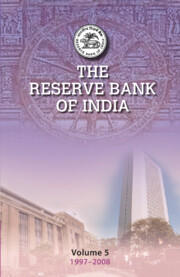Book contents
- Frontmatter
- Contents
- Tables
- Boxes
- Foreword
- Preface
- Acknowledgements
- List of Abbreviations
- 1 Introduction: Managing Liberalisation
- 2 The Macroeconomic Context
- 3 Monetary Management
- 4 Foreign Exchange Market and Management of the Capital Account
- 5 Foreign Exchange Reserves Management
- 6 Financial Markets
- 7 Public Debt Management
- 8 The Payment and Settlement Systems
- 9 Currency Management
- 10 Regulation of the Financial System – Part I: Commercial Banks
- 10 Regulation of the Financial System Part II: Other Financial Institutions
- 11 Supervision of the Financial System
- 12 Rural Credit
- 13 Financial Inclusion
- 14 Communication Policy
- 15 Organisational Change
- Appendices
- Photographs
- Select Bibliography
- Index
1 - Introduction: Managing Liberalisation
Published online by Cambridge University Press: 10 January 2023
- Frontmatter
- Contents
- Tables
- Boxes
- Foreword
- Preface
- Acknowledgements
- List of Abbreviations
- 1 Introduction: Managing Liberalisation
- 2 The Macroeconomic Context
- 3 Monetary Management
- 4 Foreign Exchange Market and Management of the Capital Account
- 5 Foreign Exchange Reserves Management
- 6 Financial Markets
- 7 Public Debt Management
- 8 The Payment and Settlement Systems
- 9 Currency Management
- 10 Regulation of the Financial System – Part I: Commercial Banks
- 10 Regulation of the Financial System Part II: Other Financial Institutions
- 11 Supervision of the Financial System
- 12 Rural Credit
- 13 Financial Inclusion
- 14 Communication Policy
- 15 Organisational Change
- Appendices
- Photographs
- Select Bibliography
- Index
Summary
This volume of the history of the Reserve Bank of India (RBI) covers events during the eleven financial years from 1997–98 to 2007–08 (the ‘reference period’). Over this period, the Reserve Bank faced several major external shocks and had to function in a rapidly changing economic environment within India. While the economic liberalisation process had begun in the early 1990s, key institutional and financial market reforms occurred, and integration of the Indian economy with the world economy accelerated, during the reference period.
The Bank shaped the transition, and adapted to it, by adjusting its approach to containing inflation and maintaining financial stability, focusing on financial market institutions and infrastructure, taking legal and other steps to achieve operational autonomy, making improvements in organisational capability and communication practices. It also worked not only to improve customer service in banks and the rural credit system but also to enhance financial inclusion. In all these efforts, the Bank relied on its own expertise as well as that available outside the organisation.
This is an institutional history. It thus records developments in policies and operations of the Bank in its functional areas and documents the evolution of the organisation itself. While the details of policies, operations and organisational changes appear in subsequent chapters, this introductory chapter presents a compact account of these developments during the reference period. The chapter begins with a brief review of the macroeconomic trends and political situation, followed by a review of the major areas of activity of the Bank during the reference period, and a brief chapter outline.
Backdrop
The beginning of the reference period witnessed several stressful events. The Asian currency and financial crisis (1997) posed major challenges for the policy environment in India. In the aftermath of the nuclear tests in Pokhran in May 1998, several Western nations imposed sanctions on India, leading to the partial suspension of multilateral lending, downgrading by international rating agencies and reduction in investment by foreign institutional investors.
Despite these shocks, the reference period saw robust growth of the Indian economy. Continuing from previous years, the corporate sector responded to increasing openness and global competition by improving productivity. All relevant financial parameters relating to solvency, liquidity and profitability improved.
- Type
- Chapter
- Information
- The Reserve Bank of IndiaVolume 5, 1997–2008, pp. 1 - 13Publisher: Cambridge University PressPrint publication year: 2023



